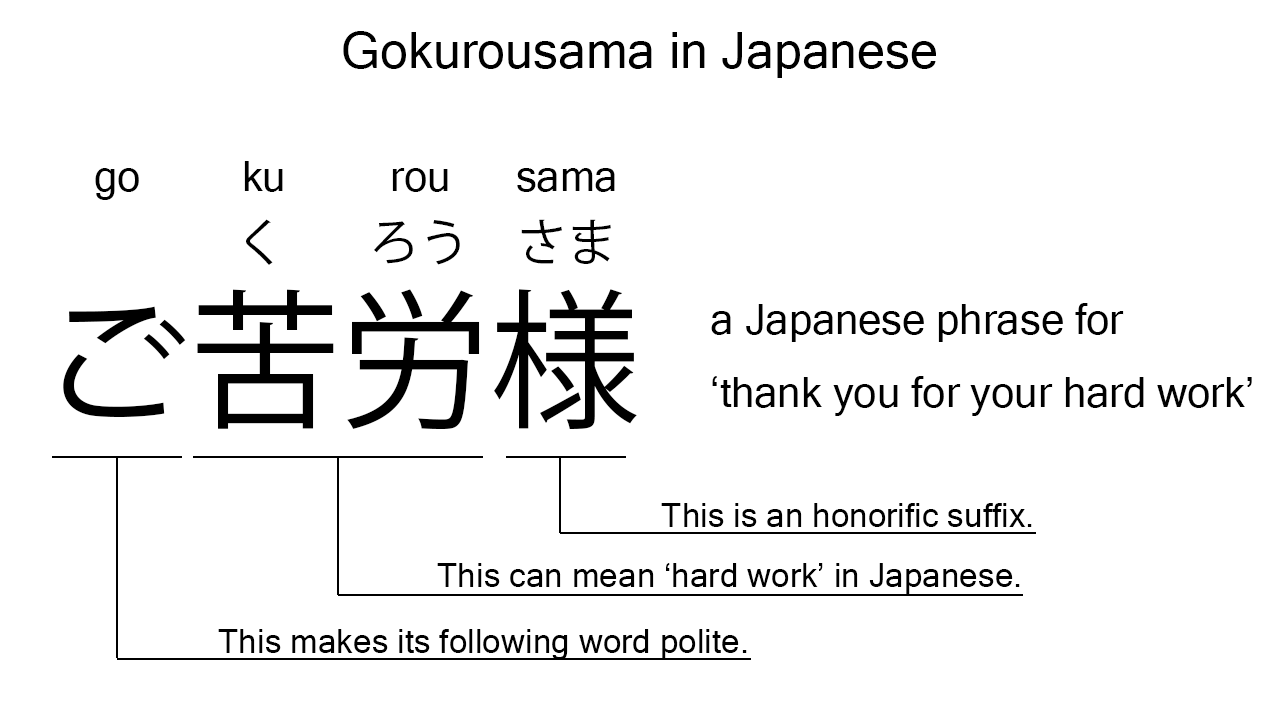What does “gokurousama” mean in Japanese?
Native speakers say “gokurousama” to express their appreciation for someone’s hard work – to mean ‘thank you for your hard work’ in Japanese. Perhaps, some Japanese learners know this phrase as it is sometimes used in Japanese conversations. In this blog post, however, I will explain it in detail based on its grammatical components. And also, I will explain how to use it through example sentences. My explanations would help Japanese learners understand “gokurousama” more clearly. Then, let’s get started!
Contents
Definition and meaning of “gokurousama”
Let me start with the definition and meaning of “gokurousama”.
- gokurousama – ご苦労様 (ごくろうさま) : a Japanese phrase used to express appreciation for someone’s hard work. This is often translated into English as “thank you for your hard work”.
The definition and meaning are not that difficult, I think. To understand this phrase more clearly, however, let me explain its grammatical components in detail, one by one.
What does “gokurousama” literally mean in Japanese?
The phrase consists of the following three components:
- go – ご : a prefix making its following word polite.
- kurou – 苦労 (くろう) : a noun meaning ‘hard work’ or such in Japanese.
- sama – 様 (さま) : an honorific suffix often used after a name. This can sometimes be used after a noun or noun equivalent word which is preceded by “o” or “go”. In the phrase, this is used after “gokurou” to make it sound more polite.
From these three components, we can understand that “gokurousama” is literally the polite expression of “kurou” which means ‘hard work’ in Japanese. This means, native speakers express their appreciation for someone’s hard work by politely referring to it. Sometimes, we feel happy and satisfied when our hard work is politely referred to by someone.

When we meet new Japanese phrases, we should check their grammatical components in detail to understand their meanings clearly and deeply. In many cases, components tell us a lot about the meanings of the phrases they form. Actually, here, we could get the better understanding of “gokurousama” through the detailed check above.
So far, I’ve explained the definition and meaning of “gokurousama” together with its grammatical components. Then, let me explain how to use it through the example sentences below.
Example #1: how to say “thank you for your hard work” in Japanese
「gokurousama」 to kanojo ga it ta – 「ご苦労様」と彼女が言った (「ごくろうさま」とかのじょがいった)
“Thank you for your hard work,” she said.
Below are the new words used in the example sentence.
- to – と : a case particle working as a quote marker. In the example, this works after the clause to indicate what she said.
- kanojo – 彼女 (かのじょ) : a pronoun meaning ‘she’ in Japanese.
- ga – が : a case particle used to make the subject word or the object word in a sentence. In the example, this works after “kanojo” to make the subject in the sentence.
- it – 言っ (いっ) : one conjugation of the verb, “iu“, which means ‘to say’ in Japanese. In the example, it has been conjugated for the better connection with its following word.
- ta – た : an auxiliary verb used after a verb, adjective, or auxiliary verb to make its past tense form. In the example, this is used after “it” to make its past tense form, “it ta”.
This is a typical usage of “gokurousama”. In this example, it works to mean ‘thank you for your hard work’ in Japanese. When we want to express appreciation for someone’s hard work in Japanese, this phrase is a very good option.
Example #2: another usage of “gokurousama”
「gokurousama desu」 to watashi wa kaeshi ta – 「ご苦労様です」と私は返した (「ごくろうさまです」とわたしはかえした)
“Thank you for your hard work too,” I answered.
Below are the new words used in the example sentence.
- desu – です : an auxiliary verb often used after a noun or adjective to make it polite. Probably, this is well known as a part of Japanese desu form. In the example, this is used after “gokurousama” to make it sound polite.
- watashi – 私 (わたし) : a pronoun meaning ‘I’ in Japanese.
- wa – は : a binding particle working as a case marker or topic marker. In the example, this works after “watashi” to make the subject in the sentence.
- kaeshi – 返し (かえし) : one conjugation of the verb, “kaesu”, which means ‘to answer’, ‘to reply’, ‘to return’, or such in Japanese. In the example, it has been conjugated for the better connection with its following word.
This is another typical usage of “gokurousama”. In this example, it works together with the auxiliary verb, “desu”, to become more polite. Japanese native speakers sometimes use this combination to express their appreciation in a more polite way. It’s worth knowing, I think.
Summary
In this blog post, I’ve explained the definition and meaning of “gokurousama” in detail based on its grammatical components. And also, I’ve explained how to use it through the example sentences. Let me summarize them as follows.
- gokurousama – ご苦労様 (ごくろうさま) : a Japanese phrase used to express appreciation for someone’s hard work. This is often translated into English as “thank you for your hard work”. This phrase is literally the polite expression of “kurou” which means ‘hard work’ in Japanese. This means, native speakers express their appreciation for someone’s hard work by politely referring to it. Sometimes, we feel happy and satisfied when our hard work is politely referred to by someone.
Hope my explanations are understandable and helpful for Japanese learners.
Leave a Reply